The video of the session “IMF's strategy on social spending facing austerity: new direction or bandaid?” is now online. The session was held on Wednesday, April 12th, 2023.
Civil society welcomed the IMF's new policy on social spending in 2019. However, we are concerned that spending on social protection, health and education is still not given sufficient priority in government budgets. Indeed, we fear conditionality in IMF country programs will continue to negatively impact essential social spending. How should IMF and other international agencies, labor movements and CSOs each work to enhance and protect national social spending programs? And, how might international cooperation be strengthened to assure more adequate, efficient, universal and sustainably financed social protection and social services in all countries.
Moderator: Alex Cambpell, International Trade Union Confederation (ITUC)
Panelists:
The event took place at the Civil Society Policy Forum (CSPF) during the 2023 International Monetary Fund - World Bank Group Spring Meetings that was held from April 11 to April 14, 2023 in Washington DC. The video and further information are available here.
The event was co-organized by the Global Coalition for Social Protection Floors (GCSPF), Bretton Woods Project, Human Rights Watch, International Trade Union Confederation (ITUC), Kvinna till Kvinna Foundation, NGO Committee on Financing for Development, Oxfam International, Social Justice in Global Development, Social Policy Initiative (South Africa).
This event was dedicated to the memory of Prof. Michael Cichon. Michael was the inspiration behind and driver of Recommendation 202, founder of the Global Coalition for Social Protection Floors (GCSPF) and he has been an inspiring example to so many people around the world.
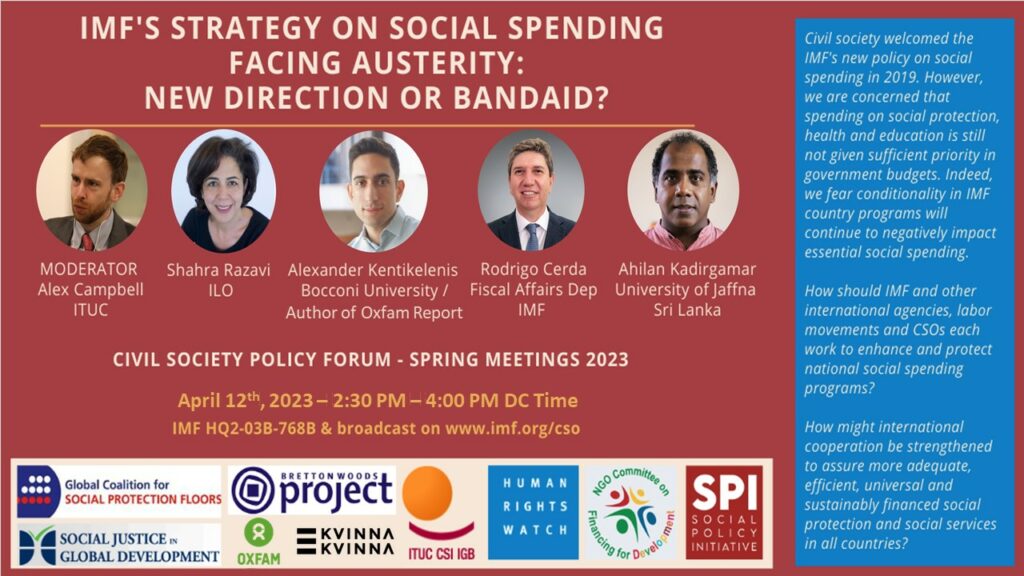
The hybrid session “IMF's strategy on social spending facing austerity: new direction or bandaid?” will be held on Wednesday, April 12th, 2023, from 2:30 pm to 4:00 pm EDT in the IMF HQ2-03B-768B meeting room.
Simultaneous interpretation will be available to Spanish, French, and Arabic for those participating online. Registration is not needed for those that will be joining sessions on zoom. Here is the link for the session:
https://imf.zoom.us/j/98300942112?pwd=NlZQLzVvdU5pbGVjeGdyZThvWFZxZz09
To check your local time zone, please click here.
The session will be broadcast on the IMF website: www.imf.org/cso.
This event will be dedicated to the memory of Prof. Michael Cichon. Michael was the inspiration behind and driver of Recommendation 202, founder of the Global Coalition for Social Protection Floors (GCSPF) and he has been an inspiring example to so many people around the world.
Civil society welcomed the IMF's new policy on social spending in 2019. However, we are concerned that spending on social protection, health and education is still not given sufficient priority in government budgets. Indeed, we fear conditionality in IMF country programs will continue to negatively impact essential social spending. How should IMF and other international agencies, labor movements and CSOs each work to enhance and protect national social spending programs? And, how might international cooperation be strengthened to assure more adequate, efficient, universal and sustainably financed social protection and social services in all countries.
The event will take place during the 2023 Spring Meetings of the World Bank Group and the IMF and the Civil Society Policy Forum that will be held from April 10 to April 16, 2023 in Washington DC.
The event is co-organized by the Global Coalition for Social Protection Floors (GCSPF), Bretton Woods Project, Human Rights Watch, International Trade Union Confederation, Kvinna till Kvinna Foundation, NGO Committee on Financing for Development, Oxfam International, Social Justice in Global Development, Social Policy Initiative (South Africa).
Moderator: Alex Cambpell, International Trade Union Confederation (ITUC)
Panelists
Rodrigo Cerda, Division Chief, Expenditure Policy Division, Fiscal Affairs Department, International Monetary Fund (IMF)
Shahra Razavi, Director, Social Protection Department, International Labour Organization (ILO)
Alexander Kentikelenis, Oxfam International
Ahilan Kadirgamar, Senior Lecturer, Department of Sociology, University of Jaffna, Sri Lanka

The webinar “Be an expert universal social security advocate” was moderated by Lena Simet, Senior Researcher and Advocate, Human Rights Watch.
Stephen Kidd, CEO, Development Pathways (download his presentation), and Holly Seglah, Social Protection Officer, Development Pathways (download her presentation) were the speakers.
Richard Obiga (Programme Officer, Social Protection Secretariat, Kenya) and David Tumwesigye (Global Advocacy Manager, Save the Children International) shared their comments and there was a rich discussion with the audience.
Background
The importance of social security (or protection) is widely and increasingly recognised. However, the question on whether the systems should be built on means-tested and poverty-targeted benefits or on a universal approach is widely debated.
The language we use shapes our thinking, while also shaping the thinking of those with whom we communicate. There is strong evidence for why universal benefits are the best strategy to Leave No One Behind. But “poverty-targeted” support is easily perceived as “pro-poor”, so those who advocate for universal social security need to have very clear arguments.
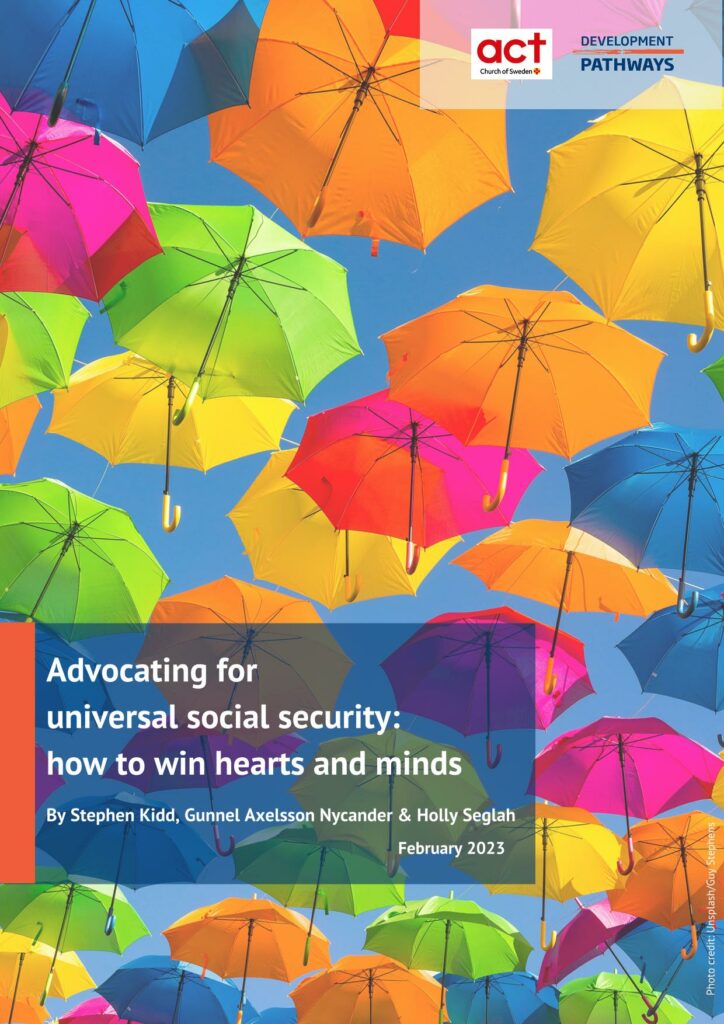
In this webinar, Development Pathways and Act Church of Sweden presented the report, or rather a guide for advocators: Advocating for universal social security: how to win hearts and minds (pdf format).
The document builds on evidence presented in earlier research, and suggests how advocacy for universal social security can be carried out in the most effective way: the words and arguments to use and who to approach.
For further information please contact Gunnel Axelsson Nycander.
The invitation is available here and their bios are here.
This webinar was organised by Development Pathways and Act Church of Sweden and co-organised by the Global Coalition for Social Protection Floors (GCSPF).
Barry Herman made an intervention on behalf of the Congregation of Our Lady of Charity of the Good Shepherd, a member of the GCSPF and also on behalf of the GCSPF at the UN's Development Cooperation Forum. His intervention (see here) was part of the interactive discussion that followed the panel presentation.
The UN's Development Cooperation Forum that met at ministerial level on 14-15 March 2023 in New York, included a session on "Building momentum for effective social protection measures." See the programme here.
Contributing to the debate on national social protection measures were Mr. Alexei Buzu, Minister of Labor and Social Protection of the Republic of Moldova; Mrs. Fatou Gueye Diane, Minister of Women, Family and Child Protection of Senegal; Ms. Marta Eugenia Esquivel Rodriguez, Executive President of the Costa Rican Social Security Fund; and Ms. Sarah Lynne S. Daway-Ducanes, Assistant Secretary, National Economic Development Authority of the Philippines.
International cooperation on social protection, in particular "circular" cooperation among developing countries, was the focus of discussion by Mr. Mariano Berro González, Executive Director of the Uruguayan Agency for International Cooperation, Mrs. Arunee Hiam, Deputy Director-General of the Thailand International Cooperation Agency; and Ambassador Paula Narváez Ojeda, the Permanent Representative of Chile to the United Nations, joined by ambassador Agustín Santos Maraver, Permanent Representative of Spain and Ms. Beate Andrees, Special Representative and Director of the International Labor Organization Office at the UN.
A recording of the discussion is available here.
Statement in the Development Cooperation Forum on behalf of
Congregation of Our Lady of Charity of the Good Shepherd
United Nations, New York, 15 March 2023
Madam President,
My name is Barry Herman, and I make this statement on behalf of the Congregation of Our Lady of Charity of the Good Shepherd, a member of the NGO Committee on Financing for Development in New York, a substantive committee of the Conference of NGOs, and on behalf of the Global Coalition for Social Protection Floors, a network of over 100 NGOs and labour organizations that advocates for enhanced social protection around the world. We all share a keen interest in this morning’s discussion.
The NGO Committee and the Global Coalition regard social protection as a human right. An adequate package of social protection programs would help ameliorate the inherent risks of daily life from conception to old age. It would help empower people to contribute more to society and lead lives of dignity. However, social protection must have an adequate standing in every country’s fiscal accounts.
Governments should want adequate, effective, efficient, universal and sustainable social protection systems. In many countries—rich, poor, and in between—governments are overly influenced by the rich and the companies they control. They would rather starve social protection of needed funds than accept their fiscal responsibility to society.
NGOs, such as the Congregation of Our Lady of Charity of the Good Shepherd, are hard pressed to fill the gap. In fact, they cannot marshal the resources needed. It must be a government responsibility.
How does international cooperation fit into this picture?
First, donor governments and international institutions can use their voices to strengthen the global call for adequate and universal social protection systems.
Second, they can help governments develop these systems when requested.
The development community works in this direction, but it has to do more.
Further policy and cultural reforms are warranted.
One example is the policy on social spending that the International Monetary Fund adopted in 2019. The new policy encourages IMF to engage with UN agencies as well as with the World Bank on social spending. It furthermore recognizes the value of taking into consideration the expertise of civil society in the countries its missions visit.
In fact, we see greater IMF cooperation with UN agencies and civil society. However, austerity pressures seem to still come down too hard on developing economies. We still struggle to ring fence social spending during austerity drives and then adequately expand it and the taxation it requires.
It is nonetheless good to hear the progress that countries are reporting here today.
Civil society recognizes that advancing social protection is an inevitable struggle at domestic and international levels. It is a struggle that we fully embrace.
Thank you, Madam President
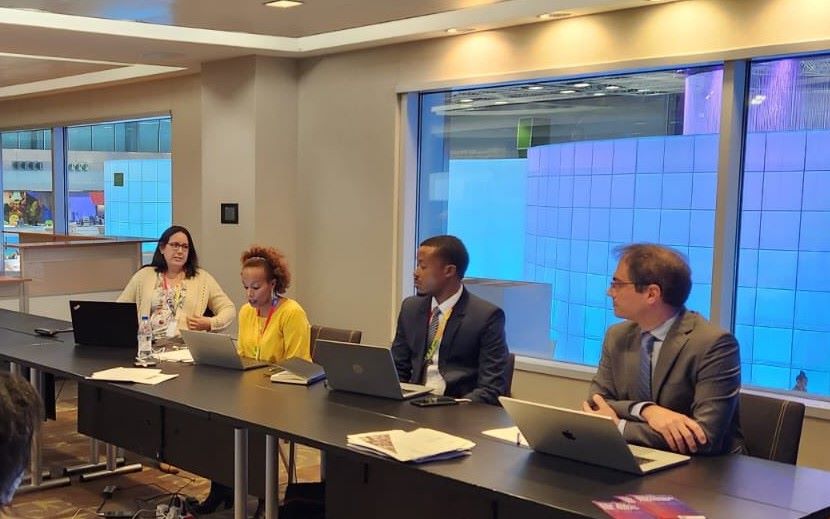
The side event “Progress through Social Protection - Current initiatives and financing at national and international level” took place on Monday, March 6th 2023 during the Civil Society Forum of the Fifth United Nations Conference on the Least Developed Countries (LDC5) that was held in Doha, Qatar.
Speakers at the event were Massimiliano La Marca (Senior Economist, International Labour Office - ILO), Elibariki Msengi (Christian Council of Tanzania), Martha Bekele (Development Initiatives, Ethiopia) and Ana Zeballos (GCSPF).
Ana Zeballos presented the work of the GCSPF. Massimiliano La Marca talked about the work of the ILO in the LDCs, particularly in the framework of the SDGs. Martha Bekele did a presentation focused on domestic and international financing, the Global Fund for Social Protection embedded in the Global Accelerator for Jobs and Social Protection. Martha also presented the new discussion paper Should Global Public Investment finance social protection? And finally, Elibariki Msengi shared with the participants the expansion of health insurance in Tanzania. The presentations were followed by a lively discussion about the situation in the different countries.
Read the programme and the invitation.
This event was co-organised by the Global Coalition for Social Protection Floors (GCSPF), Africa Platform for Social Protection (APSP), Development Initiatives, Christian Council of Tanzania, Act Church of Sweden and Brot für die Welt.
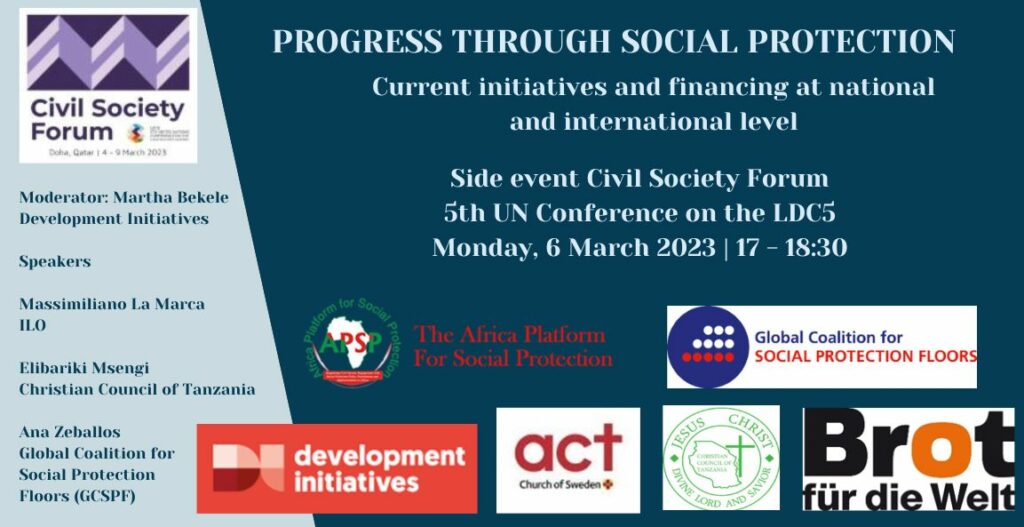
The side event "Progress through Social Protection - Current initiatives and financing at national and international level" will take place on Monday, March 6th from 5 to 6:30 pm at Civil Society Forum of the Fifth United Nations Conference on the Least Developed Countries (LDC5).
Moderator: Martha Bekele, Development Initiatives
Speakers:
Social Protection: An investment we cannot afford not to make
Massimiliano La Marca, Senior Economist ILO
Tanzania – expansion of health insurance
Elibariki Msengi, Christian Council of Tanzania
Domestic and international financing: Global Fund for Social Protection embedded in the Global Accelerator for Jobs and Social Protection
Priscilla Gavi, GCSPF and Chair of the Africa Platform for Social Protection (APSP)
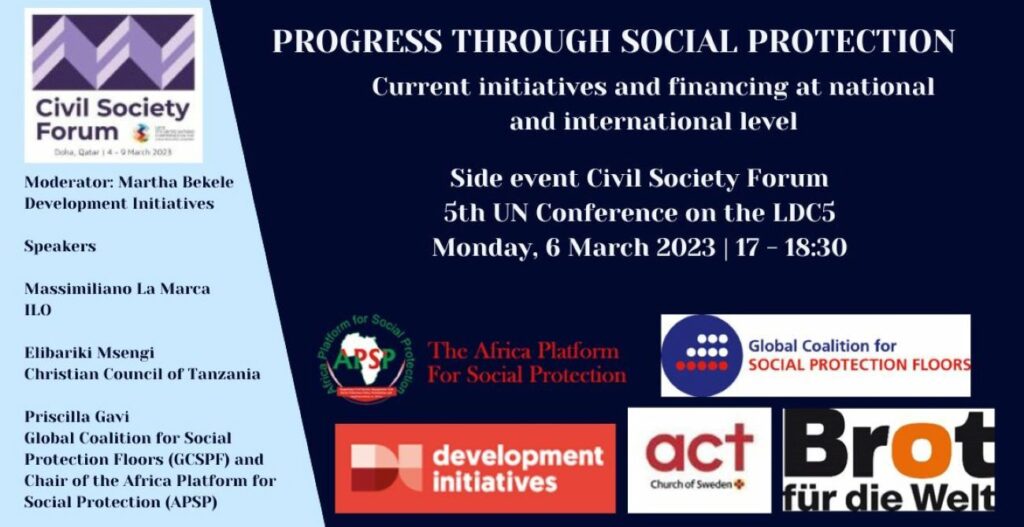
National and International Perspectives on Universal Social Protection
This side event offers civil society perspectives on national initiatives to social protection – exemplified by social health protection systems in Tanzania and Rwanda. In addition, recent international funding initiatives will be presented and discussed. A particular focus will be on the proposal for a “Global Fund for Social Protection” whose establishment is called for by both the UN Special Rapporteur on Extreme Poverty and Human Rights and by the Global Coalition for Social Protection Floors. This Fund could become an important complement to the “Global Accelerator for Jobs and Social Protection for a Just Transition” which has been initiated by the UN Secretary General.
Background
National Floors of Social Protection – i.e., the provision of access to basic health care and a minimum level of income security – is the first step towards fulfilling the human right to social security. This human right is recognized in numerous international human rights treaties and recently highlighted once again by the Protocol to the African Charter on Human and Peoples' Rights on the Rights of Citizens to Social Protection and Social Security. However, social protection floors are not only based in human rights, they are also one of the core goals of the 2030 Agenda for Sustainable Development. Evidence shows that it is an indispensable instrument in the fight against poverty (SDG 1) – and in this respect at the same time the basis for adequate health, food security and housing, especially for the most vulnerable population groups. Moreover, social protection systems serve to promote social cohesion and to provide a basis for more gender equality. Last but not least, they also make an important contribution to increase domestic demand and thus contribute to economic stabilization and resilience.
Still, most people in the world do not have access to social protection, especially in Least Developed Countries. For some countries it is very difficult – not to say impossible – to raise the necessary funds entirely from their own resources. Therefore, there have been calls for international financing mechanisms to provide the required initial funding for the establishment of cash transfer and other social protection programs.
The importance of universal social protection systems is emphasized throughout the Doha Programme for Action, including two important targets:
- Achieve a sustainable increase in coverage of nationally appropriate comprehensive and universal social protection systems and measures, including floors, for all in the least developed countries. (Para 38.)
- Ensure adequate domestic and international support to strengthen inclusive social protection systems in the least developed countries, to address current poverty and vulnerability and future shocks. (Para 202.)
This event is co-organised by the Global Coalition for Social Protection Floors (GCSPF), Africa Platform for Social Protection (APSP), Development Initiatives, Christian Council of Tanzania, Act Church of Sweden, Brot für die Welt.
Download the concept note (pdf version).
The video of the side event: On the Road to 2025: A New Social Contract with Universal Social Protection and Full Employment and Decent Work for all is now online. The event took place on Wednesday, February 8, 2023, during the 61st Session of the Commission for Social Development CSocD61.
The event was dedicated to the memory of Prof. Michael Cichon. Michael was the inspiration behind and driver of Recommendation 202, founder of the GCSPF and he has been an inspiring example to so many people around the world.
Moderator: Eppu Mikkonen, Finnish Development NGOs Fingo
Session 1: Welcome and overview of the topic
• Ms. Hanna Sarkkinen, Minister of Social Affairs and Health of Finland - The road to the Social Summit 2025, the urgency of a “renewed” social contract to ensure full implementation of the right to social protection. Download the speech.
• Dr. Veronika Wodsak, ILO/USP2030 - Priority Theme - decent work, SPF; evidence of SP impact. Download the presentation.
• Priscilla Gavi, Africa Platform for Social Protection (APSP) – Charting progress on the right of all Citizens of Africa to Social Protection. Download the presentation.
Session 2: Action for Change: collaboration between civil society and the United Nations
• Laura Alfers, Women in Informal Employment: Globalizing and Organizing (WIEGO) - Ensuring the informal sector have the right to social protection. Download the presentation.
• Dr. Abiola Tilley-Gyado, Board Chair, Society for Family and Social Protection in Nigeria, board member of Nigeria Network of NGOs/GCAP Nigeria; Experience and call for action of those who are Left Behind. Download the presentation.
• Paul Divakar, GCAP Global Co-Chair
• Nicola Wiebe, Global Coalition for Social Protection Floors; Financing gaps and role of the Global Fund. Download the presentation.
The side event was organized by the Global Coalition for Social Protection Floors (GCSPF), and co-organized by Global Call to Action Against Poverty (GCAP), Gray Panthers, African Platform for Social Protection (APSP), Congregation of Our Lady of Charity of the Good Shepherd.
The Concept Note is here and the invitation is here.
Read the position paper of the GCSPF at the CSocD61.
The Priority Theme of the 61st Session of the United Nations Commission for Social Development (CSocD61) was ‘Creating full and productive employment and decent work for all as a way of overcoming inequalities to accelerate the recovery from the COVID-19 pandemic and the full implementation of the 2030 Agenda for Sustainable Development.’ The CSocD took place from 6 to 15 February 2023 at the United Nations Headquarters in New York.
Date: Wednesday, February 8, 2023
Time: 1:15 pm – 3:00 pm EST (Confirm your local time here)
Please register at: http://bit.ly/3D3Dek7
The side event will be in English. French and Spanish interpretation will be provided.
Organized by the Global Coalition for Social Protection Floors (GCSPF). Co-organized by Global Call to Action Against Poverty (GCAP), Gray Panthers, African Platform for Social Protection (APSP), Congregation of Our Lady of Charity of the Good Shepherd
Concept Note
The Virtual Side Event: On the Road to 2025: A New Social Contract with Universal Social Protection and Full Employment and Decent Work for all will take place during the 61st Session of the Commission for Social Development CSocD61.
Social protection is a human right and an investment with high social and economic returns – yet more than half the world’s population do not have access to comprehensive social protection. Coverage remains particularly low for marginalized children, people with disabilities, older people, widows, women, people working in the informal economy, migrants, and the LGBTQI community.
COVID-19 has highlighted inequalities and served as a stress test for access to social protection, basic human rights, income, health security, and such essential goods as housing and food. People living in poverty have been particularly vulnerable during the COVID-19 pandemic.
Many countries have realized both the necessity and the long-term benefits of universal, comprehensive, and adequate social protection for all, based on sustainable and equitable financing, robust, adapted, and tripartite administration anchored in law. The necessity for guaranteeing, financing and delivering social protection to all, including the hardest to reach may require, notably in low-income countries, the technical and financial support of a Global Fund for Social Protection.
To respond to the recovery of the COVID-19 pandemic, many countries have put in place some social protection responses to support workers, children, and families1. However, these are, for the most part, ad hoc measures of short duration, and need to be transformed into sustainable social protection.
Creating full and productive employment and decent work for all is integral to an ethical and moral vision. However, the informality of work appears to be growing worldwide and becoming the new normal, with over sixty percent of the global workforce supporting themselves in this way- hoping to meet their basic daily needs without health coverage, social insurance, or access to maternity or sick leave. In Africa, this figure can be as high as eighty percent. Further, these informal workers do not have voice and representation for their interests and are often prohibited from unionizing.
While this has been the norm in emerging economies, today the trend is on the rise in more developed and globalized economies, in the form of deregulation, outsourcing, and flex and temp work. All of this erodes the dignity of the person and violates human rights and opportunities for decent work conditions. The globalized nature of finance, investment and business ventures is facilitating this erosion with exploitative practices against people and the planet itself2.
It is more important than ever to make connections between social protection and the ongoing crisis, strengthen and scale up social protection systems and for that a renewed social contract is needed to ensure an inclusive and sustainable recovery for all.
The Global Coalition of Social Protection Floors (GCSPF) invites you to a 105-minute side event with speakers from Governments, United Nations, and civil society.
We will tackle the diverse and interconnecting perspectives on social protection and the urgency of a “renewed” social contract anchored in human rights for a new era and consider why the Global Fund for Social Protection is necessary to deliver to all the right to social protection.
Insights and conclusions will be inputted into the ongoing work of the Commission for Social Development and the discussions about the Global Fund for Social Protection.
Read here the position paper of the GCSPF at the the 61st Session of the Commission on Social Development: ‘Creating full and productive employment and decent work for all as a way of overcoming inequalities to accelerate the recovery from the COVID-19 pandemic and the full implementation of the 2030 Agenda for Sustainable Development.’
Details of the virtual side event
Date: Wednesday, February 8, 2023
Time: 1:15 pm – 3:00 pm EST (Confirm your local time here)
Please register at: https://us06web.zoom.us/meeting/register/tZEqf-qtrT8iGtekNIJL1OnNxMmYOcuopcwA
The side event will be in English. French and Spanish interpretation will be provided.
Moderator: Dr. Paul Ladd, Executive Director UNRISD
Session 1: Welcome and overview of the topic
• Ms. Hanna Sarkkinen, Minister of Social Affairs and Health of Finland - The road to the Social Summit 2025, the urgency of a “renewed” social contract to ensure full implementation of the right to social protection.
• Dr. Veronika Wodsak, ILO/USP2030 - Priority Theme - decent work, SPF; evidence of SP impact
• Priscilla Gavi, Africa Platform for Social Protection (APSP) – Charting progress on the right of all Citizens of Africa to Social Protection.
Session 2: Action for Change: collaboration between civil society and the United Nations
• Laura Alfers, Women in Informal Employment: Globalizing and Organizing (WIEGO) - Ensuring the informal sector have the right to social protection.
• Dr. Abiola Tilley-Gyado, Board Chair, Society for Family and Social Protection in Nigeria, board member of Nigeria Network of NGOs/GCAP Nigeria; Experience and call for action of those who are Left Behind
• Nicola Wiebe, Global Coalition for Social Protection Floors; Financing gaps and role of the Global Fund
Conclusions and Recommendations
• Dr. Paul Ladd, Executive Director UNRISD
Notes:
1 http://www.socialprotectionfloorscoalition.org/2020/12/the-global-coalition-for-social-protection-floors-the-ilo-and-unicef-join-forces-to-expand-social-protection-for-all-through-sustainable-financing/#_edn7
2 Statement submitted by Congregation of Our Lady of Charity of the Good Shepherd to the Commission for Social Development Sixty-First Session 6-15 February 2023.
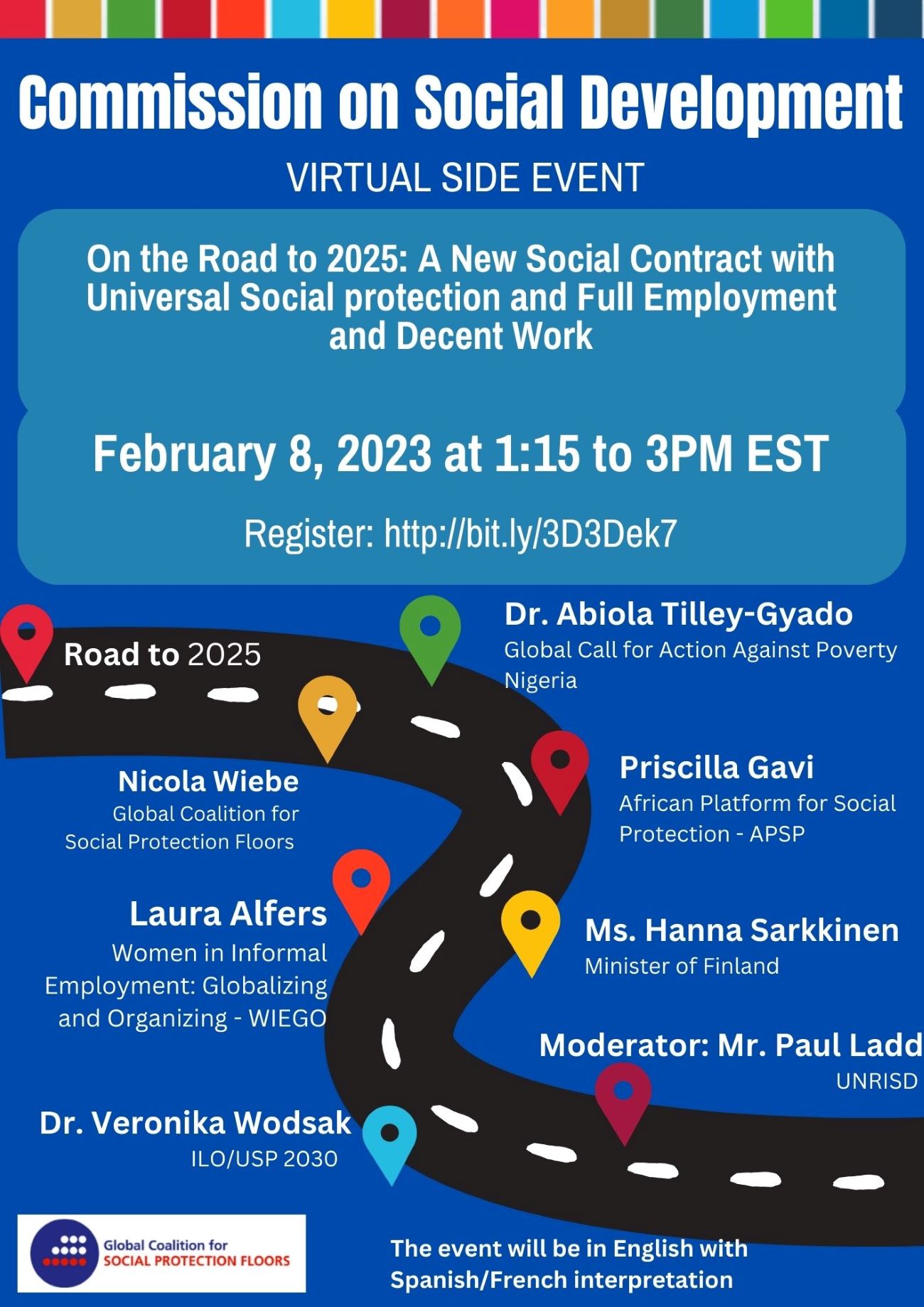
Winifred Doherty of the Congregation of Our Lady of Charity of the Good Shepherd prepared the position paper. International KOLPING, International Presentation Association, Social Justice in Global Development, JusticeMakers Bangladesh, and Free Trade Union Development Center Sri Lanka, all members of the Global Coalition for Social Protection Floors endorsed the paper.
*************
The Global Coalition for Social Protection Floors (GCSPF) welcomes the theme of the 61st Session of the Commission on Social Development: ‘Creating full and productive employment and decent work for all as a way of overcoming inequalities to accelerate the recovery from the COVID-19 pandemic and the full implementation of the 2030 Agenda for Sustainable Development.’ The realization of this optimistic theme presumes a conducive socio-political-economic-human rights informed environment. The reality is that the global community is living through very turbulent times with ‘code red’ alarm bells sounding for the very survival of the planet. The ongoing economic effects of COVID-19, increasing hunger, ongoing war, displacement of people, and climate change, coupled with runaway inflation, are entrenching more and more people in poverty and further increasing inequality. This current situation has knocked us off track in achieving the Sustainable Development Goals. The recent report in the Third Committee by Mr. Olivier De Schutter, Special Rapporteur on Extreme Poverty and Human Rights, highlighted povertyism” and “negative attitudes and behaviours towards people living in poverty that restrict people’s access to employment, housing, health care, education and social protection - the very tools put in place to support them out of poverty.”
Commitment 3 of the Copenhagen Declaration and Platform for Action (1995): ‘promoting the goal of full employment as a basic priority of our economic and social policies, and enabling all men and women to attain secure and sustainable livelihoods through freely chosen productive employment and work’, has failed miserably in the context of the global reality twenty-eight years later. One of the main reasons for this failure has been the lack of critical analysis of the impacts of dominant systems and structures and how these actually facilitate exploitation, perpetuate inequality, ignore human rights violations, and exclude people in poverty from having equal access and opportunity. Power imbalances, and unexamined systems and structures are the carriers and drivers of much of the inequality and injustice experienced in today's world. Decision making at the financial, corporate and business levels have not incorporated moral and ethical considerations.
A paradigm shift is required from long-established sets of concepts, mindsets and ‘business as usual’ approaches that have informed and shaped policies in the past but are now contributing to and exacerbating gross inequalities, while normalizing exploitation and violating workers’ rights and human rights. Alongside the technological and scientific developments, we need a corresponding shift in consciousness at the individual, corporate, societal and governmental levels- a shift informed by moral and ethical principles that are inclusive and life enhancing for all people and the planet.
The Copenhagen Declaration, with its principles, ten commitments and platform for action, is informed by moral and ethical principles. The same moral and ethical compass guided the 2030 Agenda for Sustainable Development. SDGs 1, 5, 8 and 10 are at the centre and aim to promote inclusion and reduce inequalities. While the implementation of Social Protection including floors had been gaining traction prior to the pandemic, the International Labour Organization’s (ILO) Flagship Report, Social Protection Report 2020-22, underlines the fact that COVID-19 provoked an unparalleled social protection policy response to protect people’s health, jobs and incomes, and to ensure social stability. It further states that establishing universal social protection and realizing the human right to social security for all is the cornerstone of a human-centred approach to obtaining social justice. Doing so contributes to preventing poverty, containing inequality, and enhancing human capabilities and productivity. Social Protection also fosters human dignity, solidarity and fairness, and reinvigorates the social contract.
Creating full and productive employment and decent work for all is integral to an ethical and moral vision. However, the informality of work appears to be growing worldwide and becoming the new normal, with over sixty percent of the global workforce supporting themselves in this way, hoping to meet their basic daily needs without health coverage, social insurance, or access to maternity or sick leave. In Africa this figure can be as high as eighty percent. Further, these informal workers do not have voice and representation for their interests, and are often prohibited from unionizing. While this has been the norm in emerging economies, today the trend is on the rise in more developed and globalized economies, in the form of deregulation, outsourcing, and flex and temp work. All of this erodes the dignity of the person and violates human rights and opportunities for decent work conditions. The globalized nature of finance, investment and business ventures is facilitating this erosion with exploitative practices against people and the planet itself.
The ILO has long sought to implement a decent work agenda, stressing that a transition to the formal economy is a pre-condition to realize decent work for all. A specific statistical indicator, SDG 8.3.1, on moving from an informal economy, seeks to measure efforts towards formalization of the economy. The expert group meeting papers, in preparation for the Commission for Social Development 61st Session, outlined the many variations and complexities within the informal economy and how it is now imperative that Member States tackle the issue and formalize decent work.
An ILO Publication ‘Women and Men in the Informal Economy: A Statistical Picture’ by Florence Bonnet, Vicky Leung and Juan Chacaltana note that poverty is a cause and consequence of informality - people in poverty face higher rates of informality, and there are higher poverty rates among workers in informal employment compared to workers in formal employment. Women are doubly exploited - firstly within the informal economy, and secondly with the burden of unpaid care work undertaken in the family and community.
‘Creating employment and decent work in new and growing sectors: Care Economy’, a presentation by Dipa Sinha, points to the unpaid nature of much care work, and to the informality that exists in the sector. The care economy is growing with increasing demand for childcare and care for older persons in all regions. While this sector is characterized by lack of benefits and protections, extremely low wages or non-compensation, and exposure to physical, mental and, in some cases, sexual harm, it has the potential to be reorganized and set within in a decent work agenda. It is clear that new solutions to the provision of care are needed on two fronts: in regards to the nature and provision of care policies and services, and in the terms and conditions of care work.
The multiple and complex challenges being surfaced during the review on informality can be addressed through the launch of global social dialogues that require a whole of government and whole of society approach in elucidating and defining a new social contract. This new contract requires a moral and ethical foundation upholding the dignity of the person, all human rights, and care for the Earth. Strong political will favouring inclusion, sustainability and accountability principles is called for, with zero tolerance of criminality, exploitative practices and human rights violations. The words of Mahatma Gandhi, “The world has enough for everyone's need, but not enough for everyone's greed”, provide an opening statement for promoting global social dialogues.
Recommendations:
Ensure Universal Social Protection as a right for every person. Governments and the international community will ensure that the budgetary resources to finance adequate social protection floors are guaranteed everywhere on the basis of national and, if necessary, international solidarity.
Accelerate the shift from informality to formality with full recognition and acceptance of the four pillars of decent work: promoting jobs and enterprise, guaranteeing rights at work, extending social protection, and promoting social dialogue. These pillars are basic to the inclusion of all, particularly people in informal work.
Hold Governments and all employers accountable for every infringement of worker rights, including the exploitative engagement of child laborers.
Engage a whole of Government and whole of society approach in the lead up to a second social summit – a summit that enhances the principles and commitments of the Copenhagen Declaration, and provide a relevant strategic framework for the transformation of systems, structures and gender relations towards a more equitable, inclusive, sustainable way of relating with one another and the planet.
End conflicts and war, which generate enormous profits for those who engage in the arms trade. Instead, invest in enhancing the well-being of people and planet through financing universal social protection, climate change mitigation and adaptation, and loss and damage.
The video of the webinar “Progressive realisation: Building inclusive social protection systems in low- and middle-income countries using the principle of universality” is now online. The webinar was held on Tuesday, November 22, 2022.
Speakers
Daisy Sibun, Social Policy Specialist at Development Pathways, author of ‘Can a leopard change its spots? A critical analysis of the World Bank’s ‘progressive universalism’ approach to social protection (download the presentation)
Marion Ouma, Postdoctoral Research Fellow, Nordic Africa Institute
Stephen Kidd, Principal Social Policy Specialist at Development Pathways
Moderator: Lena Simet, Senior Researcher and Advocate, Human Rights Watch
Background
There is broad consensus that expansion of social protection is a necessary response to the global food and economic crises. But an immediate reaction when universal social protection is proposed is often that “it is impossible, because it is too expensive!” or perhaps “we agree that universal social protection is the ultimate goal, but we must see it as a long-term vision. For now, we must target the poorest”. At this webinar we show how, in actual fact, universal programmes are a feasible and far more effective policy alternative to poverty targeting available to low- and middle-income countries. And, critically, that universality can be affordable if programmes are gradually introduced but maintain the principle of universality in their approach from day one.
Daisy Sibun launched a new paper, ‘Can a leopard change its spots? A critical analysis of the World Bank’s ‘progressive universalism’ approach to social protection (Executive summary). The paper critically analyses the justification through which the World Bank continues to promote poverty targeted programmes, despite its more recent high-level support for the idea of universal social protection, and contrasts it with the human rights-based approach to social protection as promoted by the ILO.
Stephen Kidd presented evidence on how countries can implement universal social protection schemes progressively in an affordable way through the reports Building universal social security systems using the principle of universality and Taking stock of progress: A compilation of inclusive social security programmes in low- and middle-income countries.
This event was co-organised by Act Church of Sweden, Action Against Hunger France, Development Pathways and Human Rights Watch, with the support of the Global Coalition for Social Protection Floors (GCSPF).
Over 200 civil society organizations and trade unions unite to call for a Global Fund for Social Protection to protect the most vulnerable during COVID-19 and beyond.
The programme Improving Synergies Between Social Protection and Public Finance Management provides medium-term support to multiple countries aiming to strengthen their social protection systems at a national level and ensure sustainable financing. The programme aims to support countries in their efforts towards achieving universal social protection coverage.